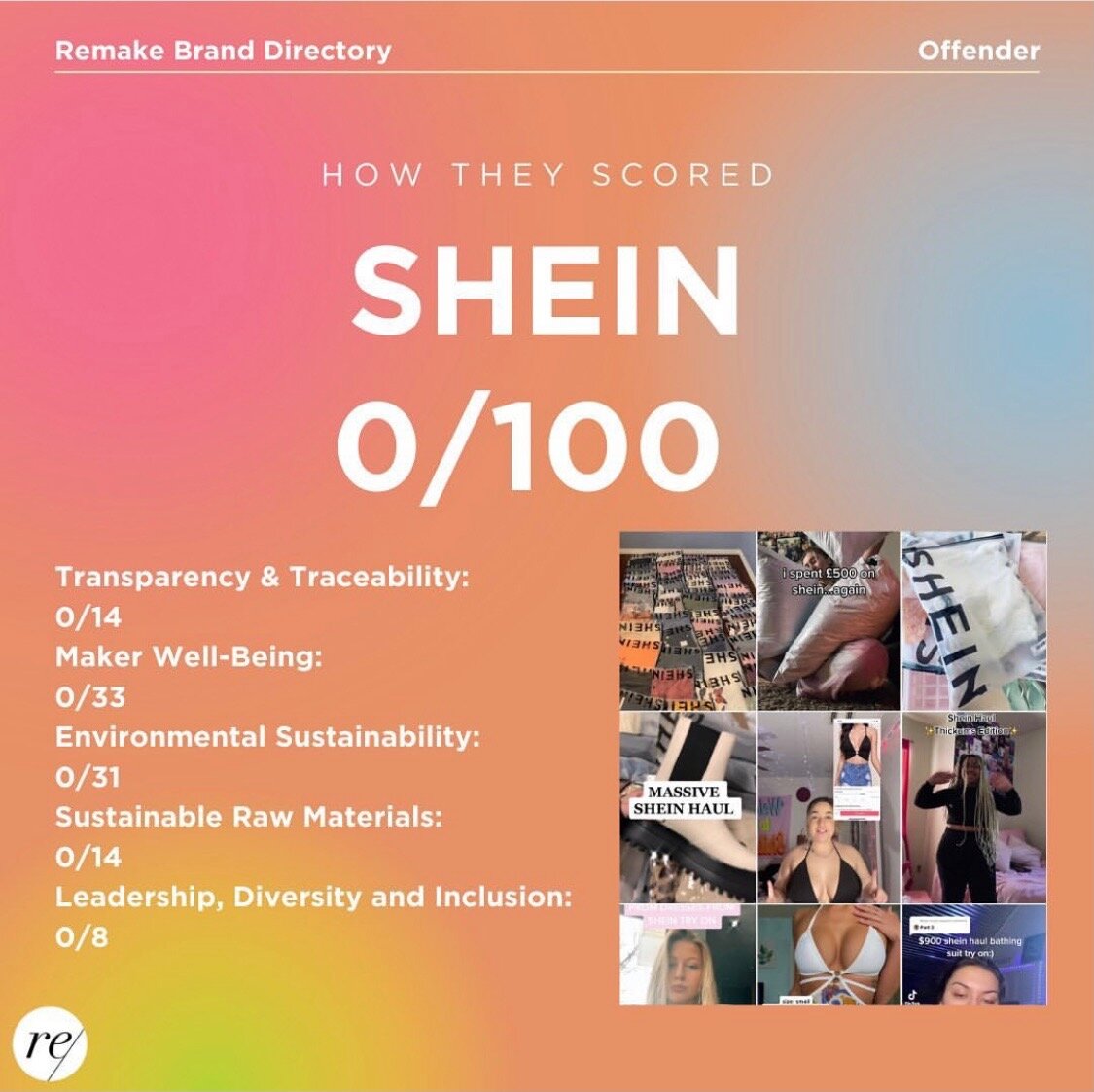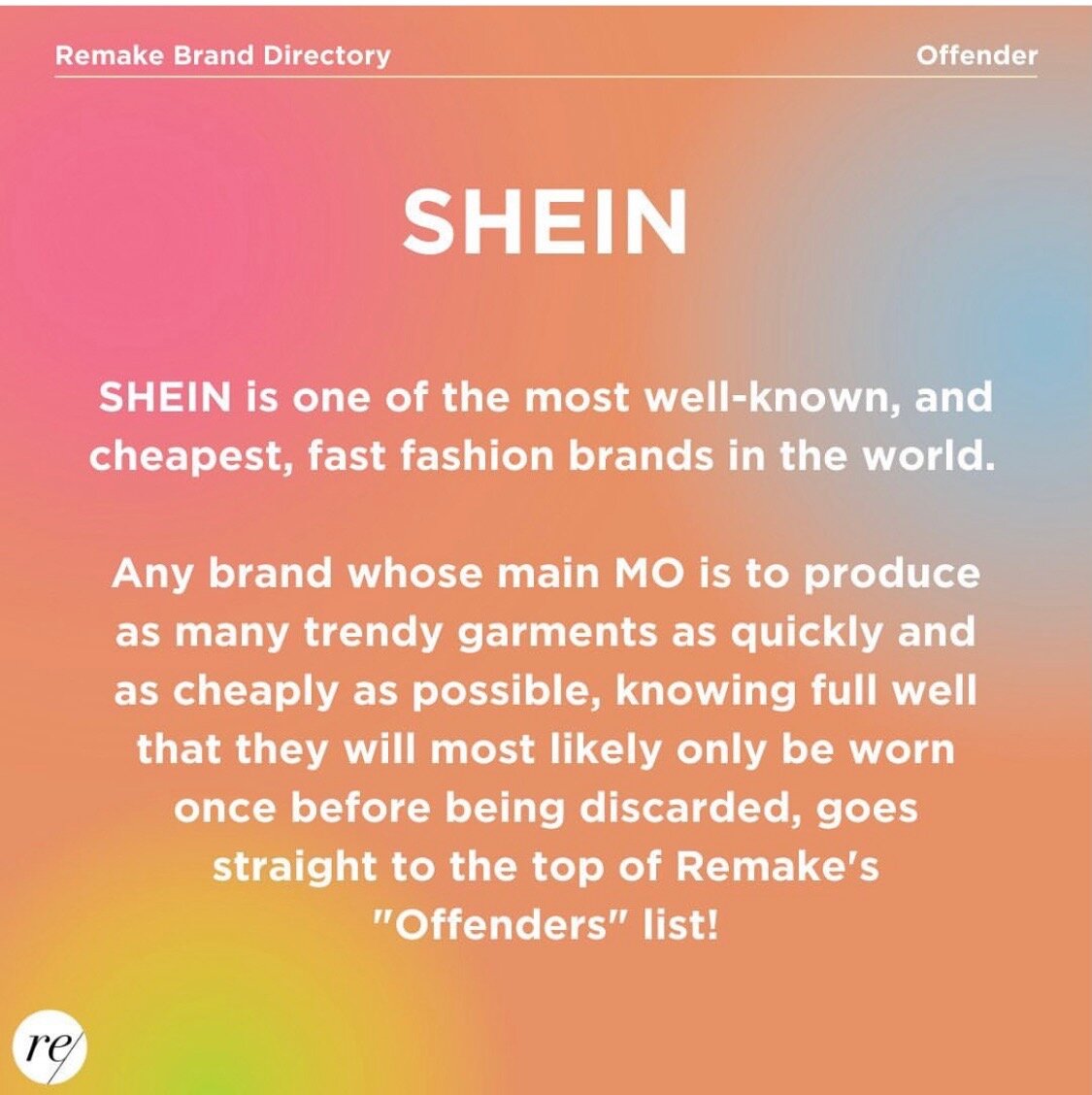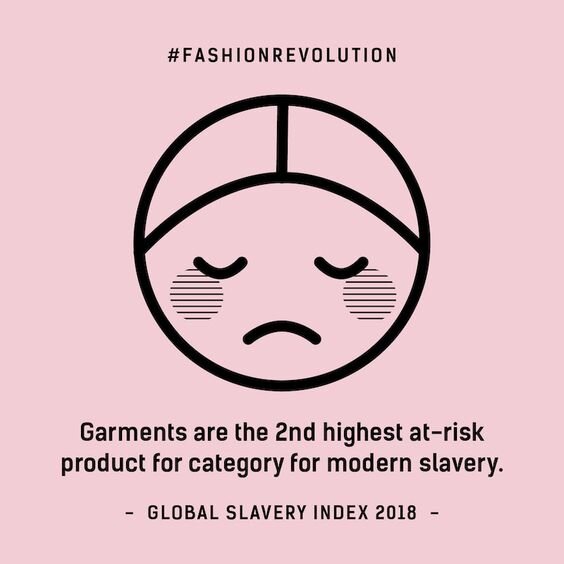Why You Need To Stop Shopping at SHEIN
Living in a world where fast fashion is the norm and trends are constantly changing, teens and young adults are always scouring the web for the cheapest finds. With the rise of globalization and e-commerce shopping, many international companies are capitalizing off these factors. By exploiting cheap labor and production costs, these fast fashion brands are dominating a large market of consumers and earning a significant profit. SHEIN has skyrocketed into one of the most popular retailers amongst college students. The appeal is the cheap clothing that keeps up with the trends… but at what cost? I am here to tell you what your five dollar purchase is really contributing to.
Sustainability & The Environment
As an apparel student studying the production process and the product life cycle of a garment, I have grown increasingly aware of my purchases. My favorite app on my phone called “Good On You” allows a quick search of any brand and will rate them in different categories to see how sustainable of a company they are. SHEIN got the lowest score possible overall and practically ranked “zero” in the environmental category.
Good on You (2021) summarizes an analysis of SHEIN’s environmental impact: “There is no evidence that [SHEIN] has taken meaningful action to reduce or eliminate hazardous chemicals. It uses few eco-friendly materials. There is no evidence it reduces its carbon and other greenhouse gas emissions in its supply chain. There is no evidence it has a policy to minimize the impacts of microplastics” (Wolfe, 2021).
As most people know, you pay for what you get, meaning that the cheaper the item, typically the lower the quality. SHEIN garments are generally made to be worn once and disposed of soon after. This overproduction and consumption of goods creates an absurd amount of textile and garment waste. This is also excluding other countless harmful factors in production such as toxic dyes, water waste, and non-biodegradable packaging. One of the largest issues with SHEIN, beyond the applicable detrimental environmental effects of fast fashion in general, is its lack of transparency and traceability regarding the steps in production. Most claims of “social responsibility” on the brand’s website have either been proven false or are hard to verify as true (Social Responsibility: SHEIN USA, n.d.). The video below provides additional information about SHEIN’s use of this practice known as greenwashing:
Poor Treatment of Labor Workers
Similarly to its environmental rating, the labor rating of SHEIN from Good On You (2021) was poor: “It should come as no surprise that SHEIN makes as much effort for people as it does for the planet—next to none. It is rated ‘Very Poor’ here, too. Again, aside from auditing some percentage of its supply chain, it is making no headway on improving its labour conditions. Workers should have the right to a living wage, collective bargaining, an abuse-free work environment, and some protection from the impacts of COVID-19. Do better, SHEIN” (Wolfe, 2021).
In the past, SHEIN has been faced with harsh criticism due to harmful labor practices such as its use of sweatshops and child labor. Similarly to the list of environmental statements on the brand’s social responsibility page, SHEIN has included vague or false claims of “fair labor practices”. For example, the following is quoted directly from SHEIN’s website: “We strictly abide by child labor laws in each of the countries that we operate in. Neither we nor any of our partners are allowed to hire underage children. Any partners or vendors found to have violated these laws are terminated immediately and reported to the authorities” (Social Responsibility: SHEIN USA, n.d.).
This claim is not only purposefully misleading, but also unsupported, furthering SHEIN’s trend of false transparency. According to Reem Farhat of Fordham University (2020), “The statement disregards the fact that child labor laws vary significantly from country to country. In Bangladesh, for example, where many fast fashion factories are located, its amended child labor laws allow children as young as 14 to work. Despite that, 17.5% of male Bangladeshi children aged 7 to 14 work” (Farhat, 2020). So, it even appears that a number of the statements included by SHEIN to dissuade consumer guilt are simply lies.
Lack of Diversity & Inclusion
Beyond the focus of sustainability, SHEIN fails to make efforts of diversity and inclusion in its brand. Many people have spoken out about the lack of diversity in its models and questioned its corporate office inclusion efforts. The following is a twitter thread about the upset from this issue:
The brand has also received a vast amount of negative response from customers with its ignorance and disrespect towards various cultures. According to Manisha Kiran, “This lack of responsibility from SHEIN went a step further, as they were also selling Muslim prayer mats on its website listed as ‘frilled Greek carpets’” (Kiran, n.d.).
One significant occurrence of backlash against SHEIN was due to the brand releasing and selling a necklace adorning a “swastika pendant”. Although the brand issued a statement explaining that the symbol was representative of the Buddhist swastika, many were still angered. SHEIN was later quoted in the New York Post (2020), stating, “We [SHEIN] wants to apologize profusely to those who are offended, we are sensitive to these issues and want to be very clear that we in no way support or condone racial, cultural and religious prejudice or hostility” (Dellatto, 2020).
Accused of Stealing Artwork from Smaller Artists & Designers
With this amounting evidence, it is clear that SHEIN places its brand value on profitability over morality. It is a shame that the success of this company has brought harm to the environment, various cultures, SHEIN’s own laborers, and the fashion industry’s image as a whole. SHEIN has also faced valid accusations of stealing artwork from smaller artists and designers, using or directly copying work without providing any credit or legal compensation on several occasions. This has been a recurring complaint on social media and other outlets as designers demand that SHEIN be held responsible for this.
As one example of this, “Artist Elora Pautrat alleged that SHEIN has created knock-off prints of its work, with a photo on the site that purportedly shows someone hand painting the piece. The artist stated in an update that although the work has been removed from the site, there has been no reply to the emails sent nor any compensation” (Cruz, 2020).
This TikTok also outlines examples of small businesses struggling due to larger fast fashion corporations like SHEIN stealing work.
One of the most famous examples that received a lot of media attention is artist and designer Ilse Valfre claiming SHEIN, along with other fast fashion companies, are ripping off her designs. This article goes into depth about the accusations: https://jezebel.com/fast-fashion-retailer-shein-accused-of-ripping-off-indi-1828518935
Although SHEIN offers some unbeatable prices, continuing to be a consumer of their goods silently contributes to the harm caused by SHEIN. SHEIN will be profiting and growing from your business, allowing them to take zero accountability for its harmful actions listed above. No progress will be made and more damage will be done due to its lack of respect for Earth and the people who live on it. There are so many better, sustainable alternatives to shopping at SHEIN. Some great brands are Pure Apparel, LONDRE, and Known Supply. Great resources for researching sustainability or sustainable brands include Good on You, Remake, and Fashion Revolution.
References
Cruz, A. (2020, December 29). Shein is once again being called out for alleged unethical practices. Preen.ph. https://preen.ph/119762/shein-history-of-stealing-art-unethical-practices-bn#:~:text=Fast%20fashion%20online%20shopping%20platform,cute%20and%20size%2Dinclusive%20clothes.&text=Back%20in%202019%2C%20a%20netizen,permission%2C%20credit%2C%20or%20compensation.
Dellatto, M. (2020, July 9). Shein slammed for selling swastika necklace, claims it's not Nazi symbol. New York Post. https://nypost.com/2020/07/09/retailer-shein-slammed-for-selling-swastika-necklace/.
Farhat, R. (2020, July 22). Shining a Light on Shein's Unethical Labor Practices. Study Breaks. https://studybreaks.com/thoughts/shein-unethical-practices/#:~:text=Shein%20has%20historically%20used%20unethical,growing%20online%20fast%20fashion%20retailers.&text=The%20industry%20is%20incredibly%20harmful,polluting%20industry%20in%20the%20world.
Kiran, M. (n.d.). SHEIN or SHE-OUT? Fast fashion brand slammed for cultural appropriation. 5X Fest. https://www.5xfest.com/5xpress/shein-fast-fashion-brand-slammed-for-cultural-appropriation.
Social Responsibility: SHEIN USA. Social Responsibility | SHEIN USA. (n.d.). https://us.shein.com/Social-responsibility-a-750.html.
Wolfe, I. (2021, March 24). How Ethical Is SHEIN? Good On You. https://goodonyou.eco/how-ethical-is-shein/.

















